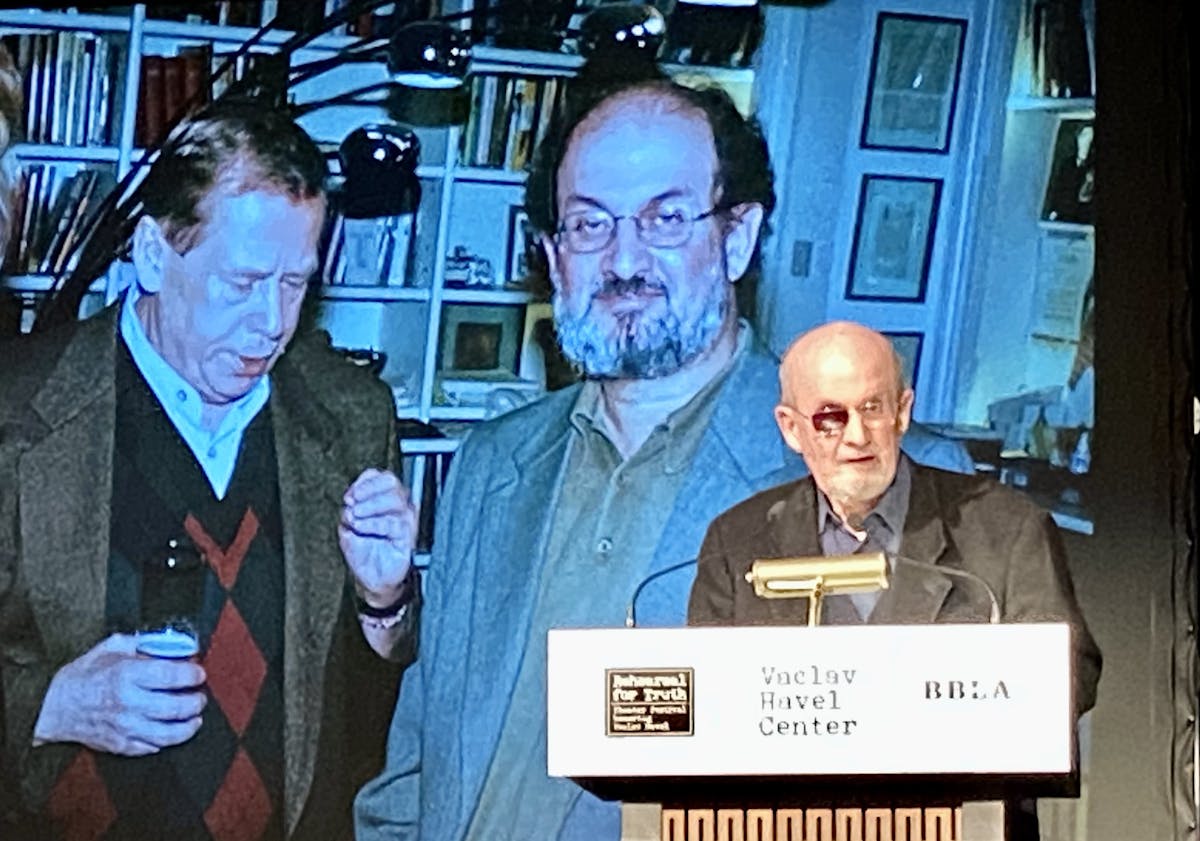Salman Rushdie Surfaces on Upper East Side To Accept Freedom Award — for ‘Disturbing the Peace’
The famed novelist, under a fatwa, is working on a memoir about meditations after an attempted murder. The book is due out in April under the title ‘Knife.’

Almost 35 years after Iran’s supreme leader Ayatollah Khomeini issued a worldwide order for his execution, Salman Rushdie rose from a seat in a crowded hall at New York City’s Upper East Side Tuesday night, a rare public appearance after being nearly killed last year by an apparent Hezbollah sympathizer.
Moving slowly due the stabbing that blinded him in the right eye, Mr. Rushdie, now 76, climbed to the stage to the sound of a standing ovation filling Bohemian National Hall. Accepting a Lifetime Disturbing the Peace Award, he said: “I apologize for being a mystery guest.”
“I don’t feel at all mysterious. But it made life a little simpler,” he said, referring to the attack at the Chautauqua Institution in western New York. On August 12, 2022, as the British-American novelist prepared to give a public lecture on the topic of the United States as a safe haven for writers, a man rose from the audience and knifed him 10 times. Mr. Rushdie was hospitalized for six weeks and suffered lasting damage to his left hand.
Next January, he is to testify in the attempted murder trial of the 25-year-old suspect, California-born Hadi Matar. According to the suspect’s mother, Mr. Matar radicalized during a trip five years ago to his parents’ native village, in southern Lebanon. According to news reports, Mr. Matar social media postings showed support for Iran and for Iran’s Islamic Revolutionary Guard Corps. At the time of his arrest, Mr. Matar was carrying a false driver’s license using the name as that of assassinated Hezbollah leader Imad Mughniyeh.
Iran’s religious leadership has never rescinded its fatwa or “death sentence” on the writer. Instead, two semi-official religious foundation in Iran had increased the bounty for killing Mr. Rushdie, to $3.3 million. After last year’s attack, Iran’s government did not comment publicly. Conservative Iranian media outlets praised the stabbing. Liberal ones condemned it.
Tuesday night, New York City Police Department provided security for the award ceremony which was held by the Vaclav Havel Center. Addressing the audience of about 150, Mr. Rushdie praised the late Czech president, saying that in 1989: “Václav Havel was the first world leader to stand up for me.”
“Havel was a remarkable figure because he was able to be an artist at the same time as being an activist, and those things are not always easy to reconcile with each other,” he said of the Czech playwright. “When I met him in Prague, I said: ‘Are you still able to write?’ ‘No,’ he said, ‘I’m only able to write speeches.’ And he regretted that, but on the whole I think it was a tradeoff he was willing to make.”
Mr. Rushdie spun a series of anecdotes about the Czech writer and dissident, who passed away in 2011. He said Havel confided to him that Czechoslovakia’s anti-communist Velvet Revolution was named after Lou Reed’s 1960s rock group, The Velvet Underground.
Mr. Rushdie recalled walking one afternoon into then-President Havel’s completely unattended office in Prague’s imposing medieval Castle. After Havel and Milan Kundera, two greats of late 20th-century Czech literature, had a falling out, Mr. Rushdie met Kundera in Paris’ La Coupole restaurant and helped to draft a “reconciliation” post card. Kundera died in Paris last July.
The warmth of the evening, hosted by veteran CBS correspondent Leslie Stahl, did not disguise the ceremony’s serious intent: speaking up for press freedom, in the United States and around the world.
Presenting the award to Mr. Rushdie was Iranian-American writer Azar Nafisi, author of “Reading Lolita in Tehran.” In a forceful speech, Ms. Nafisi called on journalists to focus on “fact-based” reporting, striving to reach the truth.
Putting a spotlight on an imprisoned Egyptian-British blogger, the Vaclav Havel Center gave their now-annual Disturbing the Peace Award to a Courageous Writer at Risk to Alaa Abd El-Fattah. Fattah’s aunt, novelist Ahdaf Soueif, accepted the award for the writer, who turns 42 on Saturday.
With Mr. Fattah in poor health, Ms. Soueif said his family is starting an international campaign to win his release. Mr. Fattah is incarcerated in Cairo’s Tora prison, where he is halfway through a five-year sentence for “spreading fake news.”
Defending freedom of expression is a constant battle, Mr. Rushdie says. Last month at Frankfurt, the Indian-born writer received the Peace Prize of the German Book Trade. He said: “We are living in a time I did not think I would have to live in. It is a time when educational institutions and libraries face censorship and hostility.”
Tuesday evening, Mr. Rushdie told The New York Sun that he continues to write. In April, he’s due to bring out a memoir about his personal battle. It is titled: “Knife: Meditations After an Attempted Murder.”

